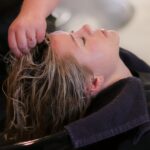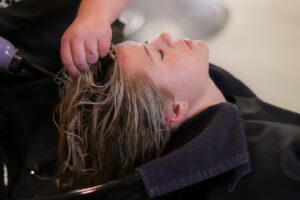We lose moisture from our skin when it gets cold, especially our scalp, which can often go unnoticed since it is covered by hair which brings us to the question of how to reduce dandruff in winter. Several factors can cause dandruff, but dry skin is the most common, mostly in cooler months when the skin’s pH gets thrown off by falling temperatures. The outcome is itching, accompanied by white to yellow flakes of skin that tend to fall off, necessitating dandruff treatments. These are some general reasons why dandruff occurs in the cold season, but it is also recommended to gain a hair specialist’s attention if your itching and irritation persist.
Tips to Get Rid of Extreme Dandruff During Cold Season
1. Keep your Scalp and Hair Clean
Regularly wash your hair with a mild, anti-dandruff shampoo to remove excess oil, dead skin cells, and flakes. Avoid using hot water, as it can strip the scalp of natural oils and contribute to dryness. Instead, gently massage your scalp while shampooing to help remove flakes and improve blood circulation.
2. Moisturizing your Scalp
Dry air during winter can lead to scalp dryness and flaking. Apply a moisturizing conditioner after shampooing to keep your scalp hydrated and nourishing. In addition, you can apply natural oils like coconut, jojoba, or olive oil to your scalp for additional moisture.
3. Avoid Excessive Heat Styling
Heat styling tools like hair dryers and straighteners can further dry out your scalp and exacerbate dandruff. Limit their use, or use them on the lowest heat setting. Allow your hair to air dry whenever possible.
4. Protect your Scalp from Cold and Wind
Wear a hat or scarf to protect your scalp from cold temperatures and wind. These elements can dry out your scalp and trigger dandruff. Opt for materials like cotton or silk that are gentle on the scalp.
5. Avoid Excessive Scratching
Scratching your scalp can worsen dandruff and lead to irritation. Try to resist the urge to scratch and gently massage your scalp to alleviate discomfort.
6. Maintain a Healthy Lifestyle
A balanced diet, regular exercise, and sufficient hydration can contribute to overall scalp and hair health. Eating a nutritious diet, staying hydrated, and engaging in physical activity can help maintain a healthy scalp and reduce the severity of dandruff.
What Causes Dandruff in Winter Season?
Dandruff during winter is primarily caused by a combination of factors related to dry and cold conditions. Here are some factors that contribute to dandruff in winter:
Dry Scalp:
Cold weather and indoor heating systems can strip moisture from the air, leading to dryness. This can cause the scalp to become dry, itchy, and flaky, resulting in dandruff.
Reduced Sebum Production:
The sebaceous glands in the scalp produce natural oils called sebum, which help moisturize the scalp and hair. In winter, these glands may produce less sebum due to the cold temperatures, resulting in a dry scalp and increased dandruff.
Overactive Fungus (Malassezia):
Malassezia is a type of yeast that naturally exists on the scalp. However, it can multiply rapidly in some individuals and disrupt the scalp’s natural balance, leading to dandruff. Cold weather can worsen this overgrowth, causing increased flaking.
Lack of Sunlight Exposure:
Sunlight exposure helps inhibit the growth of the Malassezia fungus. However, reduced sunlight exposure during winter can contribute to an imbalance in the scalp’s microflora, allowing the fungus to flourish and trigger dandruff.
Poor Hair and Scalp Hygiene:
Neglecting to wash the hair and scalp regularly during winter can lead to dead skin cells, oil, and product residue buildup. This buildup can exacerbate dandruff symptoms.
Stress:
Stress can weaken the immune system, making the scalp susceptible to dandruff. The winter season, the holiday rush, and other stressors can contribute to increased dandruff in some individuals.
In The End,
These practices can minimize extreme dandruff during winter and maintain a healthy scalp. However, excessive dandruff can cause an individual to scratch their scalp so dense that they injure it. Repeated inflammation can damage and scarring, slowing hair growth. Brushing hair aggressively, twisting it, or scratching the scalp may worsen hair loss.
Thus, if your dandruff persists or worsens despite following these tips, it may be necessary to consult a dermatologist. They can evaluate your scalp condition and recommend specific treatments or medicated shampoos to address your dandruff effectively.
Also, if you are looking for a permanent solution to get rid of hair loss and baldness, In that case, you can consider a body hair transplant; it is one of the best options, conducted when there is a deficiency of good scalp donor hair. Then, body hair is used as a substitute.
















Add Comment